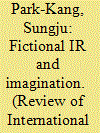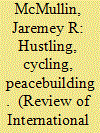| Srl | Item |
| 1 |
ID:
139582


|
|
|
|
|
| Summary/Abstract |
In the field of International Relations (IR), narrative approaches and an alternative way of writing seem to have gained growing attention in recent scholarship. Autoethnography and autobiography can be taken as primary examples. The article aims to advance this growing scholarship by proposing the concept of fictional IR. The idea is concerned with how to use the imagination in IR. I suggest that fiction writing can become a method for dealing with lack of information and contingency surrounding it. Fictional IR is more than reading and using fiction as a reference source or vehicle for analysis. It can incorporate the employment of fiction writing in IR scholarship. One of the benefits could be to articulate sensitive and complicated problems in a more flexible and imaginative way, making the most of the power of story and imagination. It should be stressed that the focal point is to write fiction; it is not to write about fiction. To support this suggestion, the article offers a short fictional-factual story. By using imagination, creating characters, combining data with fictional narrative, or with one's own experience, I believe that more original and empathetic IR writing is possible.
|
|
|
|
|
|
|
|
|
|
|
|
|
|
|
|
| 2 |
ID:
183702


|
|
|
|
|
| Summary/Abstract |
Ex-combatant youth originated the commercial motorcycling sector in Liberia and have played a dominant role in its development. This article collates key insights narrated by one of Liberia's young ex-combatants-turned-commercial motorcyclists, Edwin Nyankoon, to build narrative accounts of peacebuilding around conceptualisation of youth livelihood, identity, and politics after war. The article contributes to diverse literatures on youth agency by emphasising the need for narrative and subject-led methodologies that anchor research questions and data analysis to research participants’ own language and narrated experiences of post war. It applies insights about everyday peace to interpret hustling as bottom-up peacebuilding, in opposition to dominant top-down peacebuilding accounts of ex-combatants. These latter accounts largely fail to see youth actors as peacebuilding agents, constructing them instead as troublemakers and interpreting their livelihood activities in terms of criminality and threat. Additionally, it argues that hustling also constitutes a peacebuilding style. More than a coping strategy or an indicator of peace, hustling-as-peacebuilding-style is performative: relational, embodied, contradictory, and recognisable to its adherents as peace-promoting even if (and arguably because) outsiders construct it as peace-negating. This analysis problematises agency, social relations, gendered identity, and collective security as they relate to ex-combatant and conflict-affected youth during peace processes.
|
|
|
|
|
|
|
|
|
|
|
|
|
|
|
|